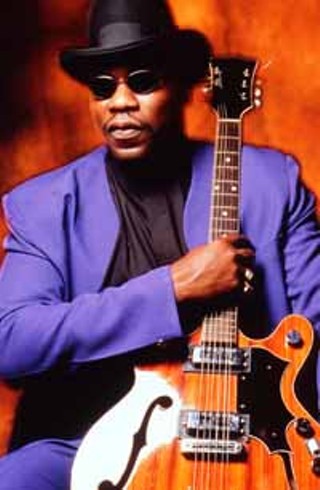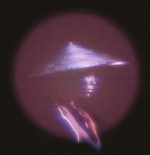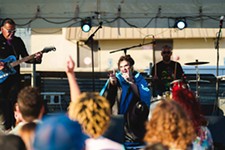Rising Son
Big Bill Morganfield Takes Over the Family Business
By Raoul Hernandez, Fri., July 6, 2001

The name Big Bill Morganfield probably means little to even the most ardent blues aficionado. That is, until one's reminded that Muddy Waters' real name was McKinley Morganfield. After that, all you really need to know is that the big, imposing, barrel-voiced, guitar-playing, 45-year-old scion of the King of the Blues is following in his father's tyrannosaurus-sized footsteps. Right on down to becoming a regular at Austin's Home of the Blues, Antone's.
"Muddy and Clifford were close buddies," says Susan Antone about her brother and the almighty blues giant, whom she estimates played their club a dozen times from its inception in 1975 to Waters' death in 1983. "Muddy became close friends with my entire family. We must be from the same tribe, that's all I can say."
Susan recalls Clifford calling her up in Los Angeles about the time of the bluesman's hard-rock crossover, Hard Again (1977), and instructing her to get to the Roxy where Waters was playing to pay the family's respects. Backstage, she was walked past a long line of rock stars waiting to get into the inner sanctum.
"As soon as he saw me," recounts Antone, "Muddy says, 'Come here,' and he sits me down in his lap. He turns to the reporters and says, 'I'd like to introduce you to my sister-in-law.' We became the best of friends. He loved my brother. He saw the pureness in what Clifford was doing. They were the best friends."
Having penned much of what passes for the modern blues repertoire, standards such as "I Can't Be Satisfied," "Rolling Stone," "Honey Bee," "Baby Please Don't Go," "Mannish Boy," "Trouble No More," "Rock Me," "Got My Mojo Working," and "Evil," Waters remains the best. Now on his second release for Bay Area blues indie Blind Pig, Big Bill Morganfield has a long way to go before arriving at said pantheon, but when he moans, "Please baby, please remember I'm my daddy's rising son," on the title track to his 1999 debut, Rising Son, the family mojo is working. Same goes for his latest, Ramblin' Mind.
"Big Bill has the same aura of Muddy," attests Susan Antone. "And he plays Muddy Waters, and with Muddy's guys. Obviously it's in his genes, because he has a marvelous talent for it. He called me in the middle of night after he played the club for the first time and told me he knew he had found a home."
Austin Chronicle: When did you get the blues?
Big Bill Morganfield: I've been doing this going on four years. Before that, I was just kinda working on it. Ten or 11 years. It took me a while, man. [Laughs] I was beginning to think that I didn't quite have it, you know? Then all of a sudden, it just started clicking in.
AC: Susan Antone says you where a school teacher and that one day it occurred to you that you needed to be in the family business.
BBM: That's right. Susan's my buddy.
AC: What precipitated this?
BBM: My daddy died. Six months after he died, that's when I started thinking about it. We had a lot of unfinished conversations, and a lot of things I didn't get a chance to talk to him about. It really started there. I wanted to do a tribute to him and [the blues] was my way of saying, 'Thanks, Dad -- for everything.'
AC: Still, it took you a while.
BBM: [Laughing] It took me a while. I had some friends come to my show in Ft. Lauderdale. I was raised down there, Ft. Lauderdale. Some of the guys I went to high school with, some of the guys I went to college with, came down. They were backstage, talking: 'Man, when you were onstage, we thought you were losing your mind. Playing that guitar.' They said, 'Man, let's go play some basketball. Put that thing down.'
Here I am, some young guy brought up on Marvin Gaye and the Temptations, and all that kind of music, and all of sudden, I'm playing the blues. It blew their minds. I don't know, I just was determined. I had a drive -- a burning desire. I just wouldn't give up. No matter what anybody said, I wouldn't give up. I was convinced I needed to see it to the end.
AC: Did you get to see your father play live?
BBM: Yeah, I saw him play when I was in college. I came down and saw him down in Atlanta, at the Agora Ballroom.
AC: What was that like?
BBM: At that time, I hadn't seen him since I was 12. From 12, all the way to my senior year in college. So here I am, a senior in college coming up to see my dad, and it was just a trip -- for both of us, really. He sat and stared at me, and I sat and stared at him. [Laughs].
AC: You probably didn't really process the music.
BBM: No, I didn't process it. I was like a little kid with his father. A little kid who hadn't seen his dad for a long time. I was just really elated to see him again. We connected and started our relationship from that point. From that point, we never lost touch again. Never. I spoke to him at least one a month. 'Til the week of his death.
AC: Tell me something about your father people don't know.
BBM: [Laughs] Pop had a sense a humor. He would do weird things from time to time. Like one time -- this is a story handed down by [his guitarist] Bob Margolin -- they were on tour, and the band was hanging out in Pop's room. Nobody had seen any girls for, like, weeks. So Pops started hutching on the bed. [Laughs]. You know? Bob said his butt was just going up and down. It was really funny. So, he had a side that a lot of people didn't see. You know, like a kid.
AC: How did he view his own legend?
BBM: I know for a fact that my dad did not know the enormity of his own status. I think my dad died not knowing. He knew he was known, but I don't think he knew to what extent. I don't think he realized that.
AC: Where did the name Muddy Waters come from?
BBM: It was given to him by his grandmother when he was so small he couldn't remember. They called him Muddy, 'cause he liked playing on the bank of the Mississippi. Later, they added Waters.
AC: How's your music coming along?
BBM: Well, you know, I'm right there rooted in that Chicago/Delta blues. I'm in the process of trying to write a group of songs that are gonna take me a little bit further from that pigeonhole, 'cause I have a huge musical background as far as R&B, gospel, and all that. I've been trying to write some songs that are rooted in the blues, but that cross over. Like Eric Clapton.
AC: Assess the state of modern blues.
BBM: Oh, man. I can't touch that one. I would have to be an ambassador to the blues. I look at myself, and I'm just a teenager. I'm just trying to hang in there. This is a tough business, man. I tell anybody that wants to get in this business, 'You make sure you want to do it, because you're not going to be getting rich, that's for sure.' I probably could be doing R&B or some other stuff and making a good living, but the blues is the route I chose.
What I wanted to do was a tribute to my daddy, and I did that on my first record, and the next one was gravy. I don't even know if I'm gonna put another one out. I've thought about going back to teaching, but they don't wanna let me, because every time I start talking like that, I get a bunch more dates on my calendar.
AC: In a sense you are an ambassador to the blues, given your father's legacy.
BBM: Well, I don't like to look at it like that. I like to look at it like, my daddy did it, I'm proud of his accomplishments, and here I am, the little son, coming up behind him. I'm not trying to take his place, not trying to do anything but keep the family right there in it. Keep the Morganfield right there in it. Somebody, in it. And I'm in it now.
AC: Must be great playing with guys who played with him, Bob Margolin, Willie Smith, Pinetop Perkins. What's that like?
BBM: It's like a dream come true. When I did Rising Son, and I was in that studio and the guys started playing, I'm like, 'Man, I'm not even on the ground.' I'm like, 'Somebody come pull my feet and let 'em touch the ground, 'cause right now, I'm just floating on air.' I went through the entire session just like that. Those guys are the shit. They know how to play it.
AC: Your daddy liked playing Antone's.
BBM: He liked those guys. He would go hang with Susan for a week. He'd be up at the house, cooking and having a good time. I mean, he loved those people. That's why the first time I went there, Susan and Cliff made me feel just like family. They sat me down, and told me all the stories about how their father and their mother was with my daddy. Anytime I come to Antone's, it's like I'm coming home, because they were good friends of my family. Here it's the next generation, and we're close too. ![]()
The Chicago Blues Band, led by Big Bill Morganfield and featuring Pinetop Perkins, Hubert Sumlin, Bob Margolin, Calvin "Fuzz" Jones, and Willie Big Eye Smith, with special guests Denny Freeman and Derek O'Brien, celebrate John Lee Hooker, 6-10pm Wednesday, July 11, and Thursday, July 12 at Antone's.








